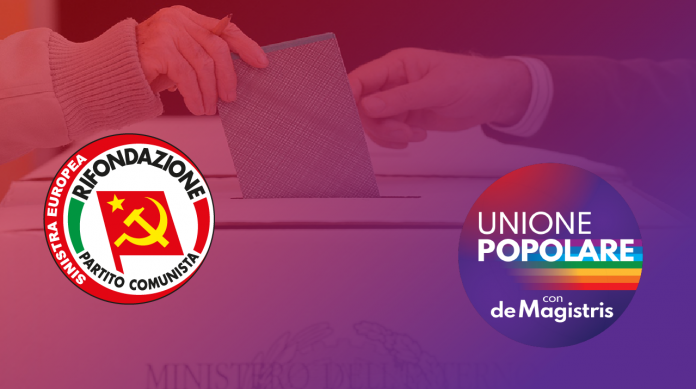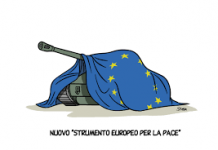Document approved by the National Direction of the Party of Communist Refoundation – European Left
The September 25 elections deliver us a country in which, for the first time in republican history, the most voted party is heir to the historical formation of the nostalgics of fascism with their flame in the symbol. The majority of seats won in the parliament is not the consequence of an impetuous growth of consensus towards the right-wing-wing coalition. Rather, there has been a redistribution of the vote within the coalition, which already with Salvini had taken on a Trumpian and Lepenist ultra-right-wing profile in recent years.
The right-wing did not win the majority of votes, it won elections characterised by the further growth of abstentions. We faced with data reflecting the deep social and democratic crisis: the lowest turnout in a general election (63.9%) and the biggest drop in voter participation compared to the previous round (over 9%) in republican history. After years of neo-liberal policies, the emptying of constitutional democracy and the cancellation of a left-wing alternative, the detachment of the working classes from politics and representation has grown enormously. The victory of the Fiamma Tricolore is the result of a long-lasting process of fascism face-washing and historical revisionism, of thirty years of bipolarity and above all of the last decade of governments with the Partito Democratico (PD) inside. The affirmation of Fratelli d’Italia should not be underestimated, because it is not an isolated episode, but fits into a European and international context that has seen the global growth of the ultra-right-wing in the last decade, from the United States to Brazil and in many European countries.
In Italy, however, the results clearly say that we are not facing a fascist wave. The percentage of abstentions is higher than that obtained overall by the right-wing coalition, which did not even obtain a majority of votes. It must be clearly stated that Giorgia Meloni’s victory is a consequence of the PD’s electoral choices and an electoral law on which the Gentiloni government asked for confidence vote and which Enrico Letta decided not to change by making a pact with the leader of the right-wing. With a proportional electoral law there would be no government led by Giorgia Meloni.
This blatantly unconstitutional and undemocratic electoral law has not only given the right-wing a majority it does not have in the country, but has denied representation to 2,817,883 voters equal to 10.47% of the electorate.
Fratelli d’Italia’s profile is characterised by the issues it shares with Salvini’s Lega: xenophobia, racism, ‘cultural war’ against women’s and lgbtqi rights, security policies, and a break with the country’s unity and principles of equality. However, they put aside the sovereignist ambitions of breaking with the European Union, within which the weight of right-wing-wing nationalist forces is growing, and the desire to reassure the Italian and international economic establishment is evident. Alignment with the USA and NATO is total. Despite the populist demagogy, the extreme right-wing returning to government is not anti-systemic in economic and social terms, nor in terms of international positioning. This is why Clinton and Draghi, before the vote, publicly legitimised the birth of an executive led by Giorgia Meloni.
The PD’s defeat is not a fact that can only be attributed to contingent wrong choices. We faced with the failure of the entire founding project, from the neoliberal programmatic framework and the subaltern identification with European and Atlantic governance. The social composition of the PD vote is the result of the anti-popular policies that have characterised the history of the centre-left.
The Italian tragedy is that for millions of people, the left continues to be identified with the PD, with the consequences that are now evident. The same relative success of the SI-Verdi list as an allied formation of the PD was at the root of the failure to aggregate an alternative left-wing pole.
In the absence of an autonomous left, strong and perceptible at mass level, Conte’s M5S has become the reference for a substantial area of left-wing voters, despite the transformism and contradictions that have characterised it in the last five years of uninterrupted presence in government. Its success in the south, as the party of “”citizenship income”, has erased the fact of the enormous drop in consensus compared to 2018. The M5S continues to occupy the space of protest and alternative in new forms, but with different characteristics from the original ‘neither right, nor left’. Its repositioning as a ‘progressive’ force was certainly a forced electoral choice, but with a right-wing government, it can only be confirmed.
Electoral data confirm that in this country there is a need for a popular and class-based left. Unfortunately, the failure of our Popular Union proposal is a picture of the reality of power relations.
The government crisis and the early elections, which caught us late in the construction of a unitary political project of the alternative left, have prevented us from developing the project that had laboriously started on 9 July and that would have needed months of weaving, interlocutions, and taking root in the country to arrive at the electoral deadline with some chance of success. We rushed into a frantic race to prepare the lists, collect signatures, and then the electoral campaign, which despite our generosity and militant commitment, could not fail to be uphill.
We must thank all the comrades who ensured the success of the signature collection and then a very fast campaign, which had raised even higher expectations than the achieved result.
The political space for our list shrank due to the configuration that characterised the campaign: the break of the PD with the M5S, which recovered, precisely thanks to the adversaries’ polemics, an image of radicality that it had lost; the break of Calenda, which made more digestible the choice of SI and the Greens of alliance with the PD. The success of Conte and the M5S in the southern regions has closed the space for Unione Popolare, despite the candidature of Luigi de Magistris even in regions such as Calabria, where only a year ago he had collected almost 17%.
Our weakness did not allow us to become a perceptible point of reference for the popular electorate and above all to reach the area of abstentions, while other options, although less coherent than ours, appeared more effective even for the more politicised and informed sectors of the left, environmentalists and pacifists.
Once again, we paid for the ostracism of the media – the almost total absence from the television news, which is still the main channel of orientation for the electorate – even though the spokesperson Luigi de Magistris managed to win a space in the talk shows that was certainly greater than the one we are used to. Once again, we found ourselves with the difficulty of making a symbol and a new political-programmatic proposal known to vast sectors of the electorate, especially the popular ones.
The legacy of previous defeats and the polls themselves weighed heavily. The doubt that Unione Popolare could not pass the 3% threshold induced a substantial part of the potential electorate towards the M5S or the SI-Verdi list. In the behaviour of the electorate, the question of the effectiveness of the vote weighs heavily, and not only in terms of the so-called ‘useful vote’ against the right-wing.
However, even more than all this, has weighed the absence of a generalised social movement. A new political representation on the left is nourished and lives first of all by the opening of a social contest in the country, rather than by propaganda, electoral action or the personification of a political operation. This is where we must start again, from campaigns against the war, the cost of living, and social impoverishment for the possible and necessary reconstruction of an alternative force.
The unsatisfactory result does not erase the fact that without the Unione Popolare project we would certainly not have achieved better results in the alternative and rupture position that we have chosen for years and confirmed at the last congress. Just think of the results of the last administrative and regional elections.
In any case, the commitment, sympathy, consensus and even enthusiasm that have coagulated around Unione Popolare must not be wasted. If Unione Popolare disappears from the scene, it would be a far more serious defeat than the electoral one.
The path, born from the convergence between our party, Potere al Popolo, DeMa, the parliamentarians of ManifestA, and other formations and many intellectuals and activists, must be continued and broadened, enhancing the first steps taken with the electoral campaign, immediately promoting territorial assemblies, in a process of democratic participation.
Around the Unione Popolare project, an area of willingness to engage has aggregated, broader than the parties that promoted the aggregation and above all intellectual energies, activists, young people. An area that must be fully involved.
The path must be continued by immediately resuming the political and social initiative in this autumn marked by the escalation of the war, the social crisis produced by high bills and inflation, and the very birth of a right-wing executive. Unione Popolare must prove to be useful as a subject and unitary space of the most coherent opposition to the right-wing government and voice of the malaise of the popular classes.
It is not a question of building a new party and dissolving the existing organisations. Such a debate would produce, among other things, an entirely internal debate, instead of the initiative and interlocutions that are needed to strengthen the project and root it in the country. Our coordinates are contained in the theses approved at the last congress: we work for a plural movement within which to find the forms in which the convergence of organised subjectivities, participation, and common elaboration can develop.
It is clear that the modalities through which to structure and bring to life the Unione Popolare, in addition to a deep discussion of our Party, must be thought out and agreed upon together with all the subjectivities that have contributed to the creation of this space of confluence that has already taken on a recognisability as a unitary political subject in the country during the election campaign. The availability of a spokesperson figure like Luigi de Magistris remains a resource for Unione Popolare, which will now finally be able to proceed along that democratic, participatory, horizontal, inclusive and open path that was not possible before, due to the electoral precipitation. The same relationship with the many struggles and conflicts must be developed in the practice of convergence, which concerns much wider areas than those already committed to Unione Popolare.
Our party is called upon to play an essential role of elaboration and initiative within the phase that has opened.
The reorganisation and strengthening of the party is an essential issue, which relates to the Unione Populare project and the building of social and political opposition. In this regard, the National Direction commits the Party to restart in the territories the path related to the holding of the National Conference of Organisation to be held on 14 and 15 January on the basis of the mandate and documents already approved, also taking into account the new political and social framework and the new tasks following the election result.
Although there will be many elements of continuity with the agenda of previous governments, one must be aware that with such a markedly right-wing government, the entire field of political confrontation is reconfigured.
The crisis of the left is such that, despite the obvious failure of the neo-liberal model, the ecological and economic crisis, and the war, mass movements capable of changing the agenda of the country and Europe are not being developed.
A left with an anti-capitalist, environmentalist, feminist, intersectional point of view is as necessary as ever in the face of a government that will pursue a mixture of reactionary populism and neoliberalism.
Two specular errors must be avoided in the construction of the opposition: that of subalternity to the forces aiming at a new technocratic solution, with the revival of a centre-left frontism without alternative content, and that of underestimating the specificity and aggressiveness of the fascist right-wing.
The election result confirms the need to build a popular and anti-war coalition that we proposed after the government crisis and, from this point of view, our initiative must be relaunched starting with the contents of the opposition to the government.
Building an anti-war and anti-cost of living movement is the immediate ground on which to mobilise and, on both issues, there is a clear need for a break with the policies pursued by governments in recent decades. We work for the development of the ‘we don’t pay’ campaign and more generally against high bills.
The National Executive commits the National Secretariat to the continuation of dialogue with the other components of Unione Popolare in order to identify the next steps and entrusts the party and the next National Political Committee with the continuation of the debate on the political phase and our tasks.
The National Directorate commits the entire party in the national deadlines already set for mobilisation, starting with the national CGIL demonstration on Saturday 8 October, the demonstration in Bologna on 22 October, the demonstrations in Naples and Rome on 5 November, the strike of the “grassroots unions” on 2 December, in relaunching the campaigns for a proportional electoral law and against any differentiated autonomy.
The National Direction expresses the solidarity and support of the PRC-EL to the mobilisation of women and young people against the repression and obscurantism of the Iranian theocratic regime and to the resistance of the people and in particular Kurdish women, who continue to be targets of the state terrorism of the Erdogan regime.
In the face of the escalation of the war, the National Direction of Rifondazione Comunista relaunches the proposal to all parties, trade unions, movements, associations, and networks positioned against the sending of weapons and for a peace solution, to call a big demonstration against the war and to propose to the European Left to work for a day of international mobilisation.
Let us build the People’s Union against the right-wing, the crisis and the war!
Document approved with 27 votes in favour
7 against, 1 abstained





